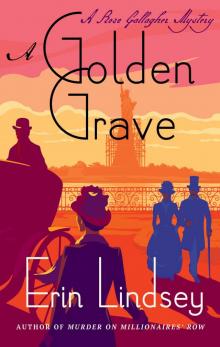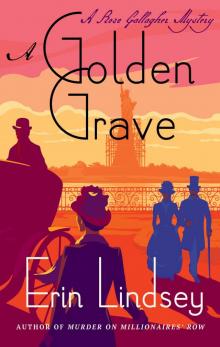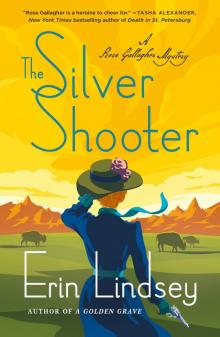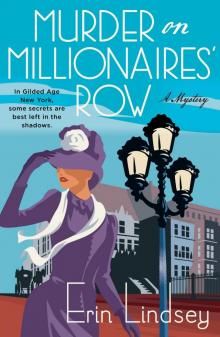- Home
- Erin Lindsey
A Golden Grave
A Golden Grave Read online
Begin Reading
Table of Contents
About the Author
Copyright Page
Thank you for buying this
St. Martin's Press ebook.
To receive special offers, bonus content,
and info on new releases and other great reads,
sign up for our newsletters.
Or visit us online at
us.macmillan.com/newslettersignup
For email updates on the author, click here.
The author and publisher have provided this e-book to you for your personal use only. You may not make this e-book publicly available in any way. Copyright infringement is against the law. If you believe the copy of this e-book you are reading infringes on the author’s copyright, please notify the publisher at: us.macmillanusa.com/piracy.
This book is dedicated to the legions of amateur historians who so generously share their passion and knowledge with the rest of us via their blogs, websites, podcasts, and books. Novels like this wouldn’t be possible without you.
ACKNOWLEDGMENTS
So much goes into researching a book like this that it would be impossible to individually acknowledge every resource. A few, however, merit particular mention. In addition to those I noted in the acknowledgments of Murder on Millionaires’ Row, which I continue to draw upon regularly, I’m especially indebted to Edmund Morris’s The Rise of Theodore Roosevelt and Margaret Cheney’s Tesla: Man Out of Time. I also drew upon Mark Twain’s autobiography, which, like everything he wrote, sparkled with wit.
I’m grateful to Lyndsay Faye, Tasha Alexander, and Mary Robinette Kowal for their kind support, which means the world to me; to everyone at Minotaur, but especially Sarah Schoof and Allison Ziegler, who’ve been so helpful and dynamic; to my outgoing editor, April Osborn, who provided such a strong steer for A Golden Grave and Murder on Millionaires’ Row, and to my incoming editor, Nettie Finn, for bringing new energy and enthusiasm to the series. And special thanks as always to my hard-working agents, Lisa Rodgers and Joshua Bilmes, and to my husband, Don, for his unwavering support.
CHAPTER 1
ROSE GALLAGHER OF THE PINKERTON DETECTIVE AGENCY—THE ART OF FALLING—NOVICES OF NEWPORT
The way the yellow-back novels tell it, being a female detective is full of flash and breathless adventure. To look at the covers, you’d be hard pressed to think of a more glamorous vocation: sly, svelte heroines smoking cigarettes and toting Colt revolvers, bursting onto murder scenes with petticoats billowing. Well, trust me, the real thing isn’t like that at all. I tried my hand with a Colt .45, but it was much too heavy. I don’t smoke, I’m more skinny than svelte, and my skirts are distinctly not of the billowing variety. As for glamour, well … it’s hard to look glamorous when you’re being thrown face-first to the floor.
I should know. By the autumn of 1886, I’d had plenty of practice.
If you’d told me back in January that I would be learning jujitsu, I’d have laughed, mostly because I’d never heard the word jujitsu. A humble housemaid from Five Points doesn’t have much occasion to acquaint herself with Japanese martial arts, no matter how devotedly she studies Harper’s Weekly. Of course, she has even less occasion to learn about ghosts, or shades or fae, or half a hundred other things collectively known as the paranormal. Your average housemaid, like the vast majority of New Yorkers, goes through her whole life without ever knowing such things exist. As for me, I’d learned about them only recently, and my world had never been the same.
For the most part I was grateful for that, but every now and then I found myself pining for the simple days when I was just Rose the Maid, scrubbing floors and mending linens. Back when Thomas Wiltshire was my employer instead of my partner; before he asked me to join him at the special branch of the Pinkerton National Detective Agency and spend my time chasing after all things paranormal.
Back when it never would have occurred to him to throw me to the floor like a sack of dirty linens.
On the morning in question—the day all the trouble started—he’d done it twice already, and I’d had about enough.
“Don’t worry, Miss Gallagher,” he said, “it’s early days yet.” And he offered me a hand, which is as close to being gentlemanly as it’s possible to get when you’ve just tossed a lady onto her face.
Except it wasn’t early days, not anymore. After eight solid months of training, I ought to have been able to last more than ten seconds against my sparring partner, even if he was the instructor. Though to be fair, it didn’t help that I still couldn’t come within five feet of Thomas Wiltshire without feeling a little weak in the knees, which is something of a disadvantage in hand-to-hand combat.
“It’s terribly frustrating, I know,” he said as he pulled me to my feet, “but don’t be discouraged. I spent the better part of my first six months in Japan on my backside. You’ll get there.”
And without further ado, he grabbed my wrist, swept my ankles, and we both went down. He landed on top of me, pinning me beneath him. His face hovered barely an inch above mine, the press of his body so close that I could practically feel his heartbeat against my own flesh.
“Good,” he said brightly.
It took me a moment to find my voice. “H-How is this good?”
“You landed brilliantly. Falling properly is half the battle.”
I’d fallen properly, and no mistake.
There was a long pause. Thomas made no move to release me, apparently oblivious to the scandalous disposition of our persons. Then: “Are you going to try to break free?”
“Yes, of course.” A furious blush warmed my face. “That is, I should have, but—”
“But the moment’s rather passed.” He rolled gracefully to his feet. “Next time. In any case, I suppose we ought to adjourn. We’ll need you in top shape tonight.”
I hauled myself up and set to righting my disheveled clothing. Try as I might, I simply could not get used to trousers, even the white cotton ones we used for training. They were forever becoming twisted up around my legs, and it was impossible to look dignified wearing them. Not that there was anything dignified about me that morning. Even my carefully pinned hair had come undone, leaving wisps of strawberry blond poking out in all directions.
“Shall I fetch us some water?” Thomas headed for the washstand, leaving me alone with the handful of other new recruits gathered around the tumbling mat for the morning lesson. I tried to busy myself with repinning my hair, but I was painfully aware of their gazes. We were few in the special branch—barely more than a dozen in the entire country, nearly half of whom were new recruits like me—but even so, there was always an audience for my humiliation.
“Well done with the falling, Miss Gallagher,” Cabot Fisk drawled. “It’s important to have a specialty.” A ripple of amusement went through the group of gentlemen, though most were too well bred to laugh out loud.
“And here I thought my specialty was fieldwork,” I said, and had the satisfaction of watching Fisk’s expression curdle. At the moment, I was the only first-year recruit on active field duty, which went a long way to explaining the chilly reception I’d had from my peers. At least, that was what I told myself.
“Here we are.” Thomas reappeared with a cup of water. “Now, you gentlemen will get along fine without us?”
Fisk gave a crisp nod. “Admirably, sir, thank you.”
“Excellent. Mr. Murray, you’ll take over as lead. Please observe the proceedings carefully—I’ll want a full account later. Miss Gallagher, shall we?”
I held my head high in retreat, but I could feel their eyes following us out of the hall.
“You’re still trying to counter me,” Thomas was saying as we walked. “Rather, try to use my momentum against me. That way
, strength and weight become irrelevant…” And so on, but I wasn’t really listening. All I wanted was to get out of that training hall—a repurposed ballroom, actually—away from the whispers and judging eyes, and take a nice long soak in the porcelain tub in my bathroom.
Yes, you read that right. My own bathroom. You had to hand it to the special branch: They’d spared no expense when it came to grooming their new crop of agents. The Queen Anne “cottage” they’d leased as a training facility sprawled over a verdant expanse of Ochre Point, one of Newport’s most eligibly situated communities. It boasted fifty rooms, including a library, music hall, billiard room, and something called a conservatory, which was stuffed with so many potted ferns that it resembled a small outpost of the Amazon. There were tennis courts, stables, a shooting range, and ample gardens. Best of all, each guest chamber was equipped with its own bathroom, a luxury I’d taken full advantage of. I’d thought it was a step up trading the communal privies in Mam’s tenement for the shared servants’ bathroom in Thomas Wiltshire’s Fifth Avenue row house. But private guest bathrooms—why, even Mr. Burrows, who was rich as a Rockefeller, was astonished to hear of it.
Of course, none of this opulence was for our benefit. It just provided a convenient disguise for the true nature of the training facility, which, like everything else about the special branch, was a closely guarded secret. Here in Ochre Point, we could hide in plain sight, blending in amongst the Boston Brahmins and New York Knickerbockers at play. Riding, shooting, archery—the silk-stocking pastimes of the East Coast aristocracy provided the perfect cover for all manner of weapons training. To the casual observer, our little band of novice agents would appear to be nothing more than a group of wealthy vacationers. And if we kept to ourselves—well, our blue-blooded neighbors were only too happy to keep their distance from the vulgar nouveaux riches.
Luxurious as it was, though, I’d had my fill of it—the theoretical classes, the etiquette lessons, the infernal jujitsu. Most of all, the inescapable feeling that I was a disappointment to Thomas, who’d vouched for me so staunchly.
“Rose.” He touched my arm, drawing me up short. As my partner, Thomas could take such liberties—an intimacy that also allowed him to guess my thoughts. “Try not to be so hard on yourself,” he said. “These things don’t come easily to anyone.”
“Are you sure about that?” I kept my gaze on the parquet floor, unable to meet his eye. “The others seem to manage just fine.”
“That’s hardly a fair comparison. Those gentlemen are all accomplished athletes. Cabot Fisk was a champion boxer at Yale. Lawrence Murray wrestled for Columbia, and Archibald Rennington gives fencing lessons at the Pewter Club. On top of which, the mere fact that they’re—”
“Men?”
“I was going to say lucky.”
He didn’t just mean fortunate, I knew. In the exclusive, highly secretive circles of the paranormal community, luck meant something very specific: a breed of extraordinary abilities possessed by a tiny fraction of the population. A tiny fraction of the general population, that is; around here, it seemed like every other person was gifted. After all, who better to handle cases involving luck than those who were lucky themselves? Even so … “I don’t see how extraordinary eyesight or an exceptional mind for numbers is a great advantage at jujitsu.”
“So the martial arts are not your forte. You have other gifts, Rose.”
“Yes, I’m told that I fall brilliantly.”
He smiled. “Mark my words, you will be one of the Agency’s most valuable assets. Sharpe has great faith in you.”
“Mr. Sharpe?” I hadn’t seen the head of the special branch since he’d agreed to hire me back in January. As far as I knew, he’d been in Chicago ever since, doing whatever it is lucky, high-ranking Pinkertons do. “Why should he have faith in me?”
“Because I do.”
I glanced up, meeting his gaze at last. Those eyes … pale blue and flecked with green, full of warmth and intelligence and curiosity and all the things I loved about Thomas Wiltshire … they always threatened to undo me. “I’m grateful,” I murmured, distracted by a brief but vivid fantasy of showing him just how grateful.
“No gratitude necessary. We are partners, are we not? Now, we’d better get on if we’re to make the city by sunset. Jackson won’t thank us for being late.”
I groaned inwardly. Another weekend chasing shades all over New York. We’d been at it since January—Thomas and I, along with Mr. Jackson, a senior agent and powerful necromancer—and I’d had about enough. A year ago, the very idea of hunting roaming spirits of the dead would have sent a shiver of dread down my spine. But after so many months, the task threatened to become as monotonous as scrubbing floors. A higher risk of death, certainly, but even that had lost much of its bite. I guess there are only so many times you can worry about the touch of a dead person stopping your heart before the thrill wears off.
Thomas saw it all in my expression. “I know, I’ve grown weary of it as well. But we’re nearly through, and just think of all we’ve achieved. How many spirits we’ve helped to find peace, not to mention how many of the living we’ve kept from harm. Every time we restore one of those spirits to the otherworld—”
“I know. I’m just tired, that’s all. Do I have time for a bath?” The thought of sinking into that warm, scented water brought a pang to my aching muscles.
Thomas reached instinctively for his Patek Philippe, only to remember that he was still wearing his jujitsu whites. “Blast. My watch is upstairs. But if we leave in an hour or so, we should have plenty of time.”
“That’ll do,” I said, and started up the staircase.
We parted ways on the landing, Thomas turning left for the men’s quarters while I headed right for the women’s—which I very nearly had to myself, there being only four women in the special branch. One of those four passed me in the corridor, and her gaze was not friendly.
“Was it you who left the windows open last night?” Viola Fox asked, without so much as a how-do-you-do. I guess she figured that since she was an instructor and I a mere novice, she didn’t owe me even the basic pleasantries.
“I-It was, yes, ma’am. My room is right above the kitchens, you see, and—”
“I fairly froze to death. It is October, you know.”
“I’m sorry,” I said instinctively, though I really wasn’t. Why should I make any effort to please this woman when she could barely trouble herself to be civil? Whatever I’d done to offend her, she seemed intent on holding it against me forever more, even if that meant inventing silly complaints like open windows.
“Do try to consider others next time, Miss Gallagher,” she said, and swept past.
I stayed where I was, drawing one steadying breath after another. It’s almost over, I told myself. Just a few more weeks. After that, the new agents would disperse—to Washington, Boston, San Francisco, every place deemed important by the Pinkerton National Detective Agency. Even Mr. Jackson would head back to Chicago, and then it would just be Thomas and me, the only two agents of the special branch permanently assigned to New York. How I longed for that day.
But in the meantime, there was a job to be done, so with a rueful sigh, I headed back to my room and started packing my trunk for the train ride back to New York. We had shades to catch.
CHAPTER 2
OF HACKS AND HANSOM CABS—PEAS IN A POD—A CONVENTIONAL MURDER
We arrived in the city a few minutes after sunset. A cold gray drizzle drifted down over Grand Central Depot, polishing the paving stones to a high gloss. Gentlemen hunkered under their umbrellas, ladies burrowed deeper into their fur tippets, and horses blew out plumes of steam under the glow of the gaslight. I pulled my own shawl more tightly about my shoulders, casting a despondent look at the hack stand—deserted, of course, it being nigh on impossible to get a cab in the rain in New York—but I needn’t have worried. As usual, Thomas had planned ahead.
“That’s us, I believe,” he said, steering me towa
rd a carriage painted in the distinctive yellow of the New York Cab Company.
“A coach.” I shivered with relief at the sight of its snugly enclosed confines. “Thank goodness. I don’t think I’d have managed a hansom cab in this weather.”
“My dear Rose, when have you ever known me to take a hansom cab? I’d rather walk.”
Plenty of New Yorkers felt the same, but I was surprised to hear an Englishman say so. “I thought hansoms were all the rage in London.”
“There are few subjects upon which I take the American view of things, but on the matter of two-wheeled carriages, they certainly have the right of it.” He opened the door and offered a hand up, and I ducked gratefully inside.
It was a short ride to 726 Fifth Avenue, and we arrived to the wonderful aroma of Clara’s cooking. Somehow, in spite of all the extra duties Clara had to contend with since being appointed housekeeper and overall manager of Thomas Wiltshire’s household, the quality of the dishes she turned out had only improved. With her typical modesty, she’d put it down to giving herself a more generous budget for ingredients, but I knew the truth: It was a sign that she was happy.
I went down to the kitchen and hugged her in greeting. “What’s cooking? It smells incredible.”
“Bouillabaisse.”
“Bouillabaisse,” I echoed wonderingly, peering under the lid of a simmering stockpot. “How exotic!”
“About as exotic as fish soup. It only sounds fancy ’cause it’s French.”
“Well, it was obviously a lot of work.” Scraps littered every surface of the kitchen, and the apron wrapped around her petite form was as spotted as a pinto pony. She even had flour in her braids.
“It’ll warm your bones, anyway.” Clara went back to kneading dough for her famous biscuits, her fine-boned hands a blur of practiced motion. “Been like this for days. Can’t say I’m ready for winter.”

 A Golden Grave--A Rose Gallagher Mystery
A Golden Grave--A Rose Gallagher Mystery A Golden Grave
A Golden Grave The Silver Shooter
The Silver Shooter Murder on Millionaires' Row
Murder on Millionaires' Row